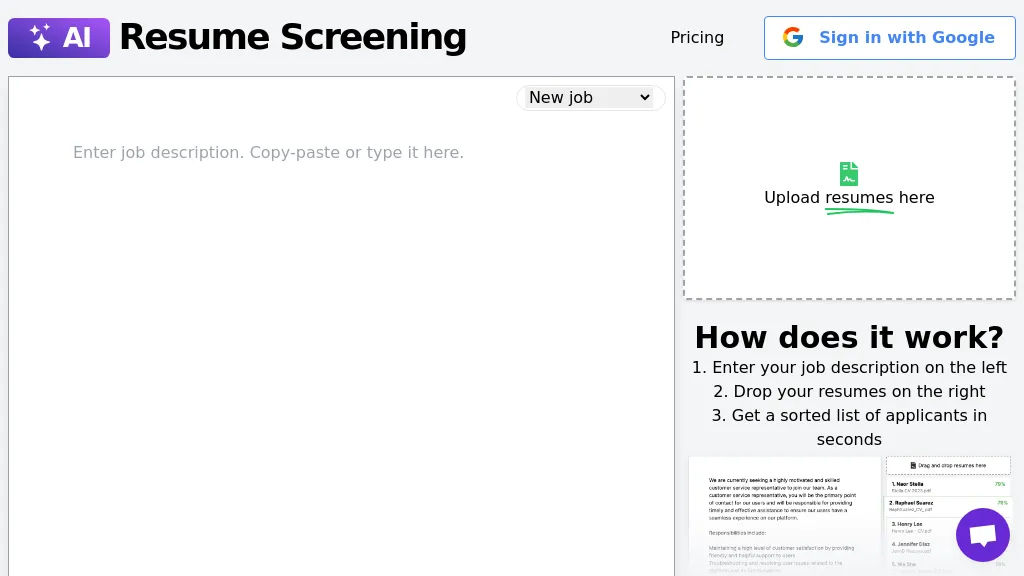Introducing AI Resume Screening, a game-changing tool for businesses and HR professionals aimed at streamlining the hiring process. Leveraging powerful machine learning algorithms, this advanced software rapidly assesses and ranks resumes against specific job descriptions, generating a meticulously organized list of applicants in mere seconds.
By incorporating AI-based screening, recruiters can save a remarkable 23 hours per hire that was previously wasted on manual resume scrutiny. This technology offers a range of benefits, including bulk resume processing, increased time and cost efficiency, improved candidate matching, objective and fair evaluations, enhanced candidate experience, robust data security measures, and customizable and scalable functionalities.
AI Resume Screening is particularly ideal for remote companies or any organization seeking rapid and equitable acquisition of top talent. With this tool, recruiters can prioritize the best candidates while optimizing their valuable time and resources.
For HR departments seeking to streamline their hiring strategies and secure high-quality hires, AI Resume Screening is an indispensable asset.
Automated Resume Parsing: Extracts relevant information from resumes.
Natural Language Processing (NLP): Understands and interprets text-based data.
Keyword Matching: Identifies key terms and skills specified by employers.
Machine Learning Algorithms: Analyzes patterns and makes data-driven decisions.
Applicant Ranking: Ranks candidates based on suitability for the job.
Customizable Criteria: Allows users to define specific job requirements.
Integration with ATS: Seamlessly integrates with Applicant Tracking Systems.
Elimination of Bias: Mitigates unconscious bias in the screening process.
Continuous Learning: Adapts and improves over time with more data.
Time Efficiency: Accelerates the screening process, saving HR time.
Scalability: Handles large volumes of resumes efficiently.
Compliance with Regulations: Ensures adherence to privacy and labor laws.
Reporting and Analytics: Provides insights into screening outcomes.
User-Friendly Interface: Facilitates easy navigation and usage for HR teams.
Keyword Matching: Resume screening AI uses algorithms to match keywords from job descriptions with those present in resumes.
Skills Assessment: It evaluates the candidate’s skills based on the identified keywords and the relevance to the job requirements.
Experience Alignment: The AI assesses the candidate’s work history, looking for relevant experience and tenure in specific roles.
Education Verification: It verifies the educational qualifications mentioned in resumes to ensure alignment with job requirements.
Formatting Analysis: Resume screening AI considers the overall structure, formatting, and layout of resumes for professionalism and clarity.
Language Proficiency: It may assess language proficiency to ensure effective communication skills.
Relevance of Information: The AI prioritizes information directly related to the job, disregarding irrelevant details.
Customization: Some systems allow customization of screening criteria to align with specific organizational needs.
Elimination of Bias: AI aims to minimize bias by focusing solely on objective criteria and avoiding subjective judgments.
Efficiency: Automation significantly speeds up the screening process, allowing recruiters to handle larger volumes of resumes efficiently.
Initial Candidate Filtering: Automate the process of reviewing resumes to identify qualified candidates.
Time Efficiency: Expedite the screening process by quickly analyzing large volumes of resumes.
Objective Evaluation: Minimize human bias by relying on predefined criteria for candidate selection.
Skill Matching: Match candidate skills with job requirements to ensure alignment.
Scalability: Easily scale the screening process to handle a high number of applicants.
Consistency: Ensure uniform application of screening criteria across all candidates.
Data-driven Decisions: Leverage analytics to make informed decisions based on quantifiable metrics.
Improved Accuracy: Enhance accuracy by reducing the likelihood of human error in the initial screening phase.
Focus on Core Tasks: Free up human resources to engage in more strategic and value-added recruitment activities.
Compliance: Ensure compliance with equal opportunity employment regulations by utilizing an unbiased screening tool.

There are no results matching your search.
ResetThere are no results matching your search.
ResetResume Screening AI employs advanced algorithms and machine learning techniques to analyze and evaluate resumes efficiently. The system is trained on predefined criteria and keywords relevant to the job, allowing it to identify key qualifications and experiences. Through natural language processing, it can comprehend and categorize information such as skills, education, and work history. The AI then generates a suitability score or ranking based on the alignment between the candidate’s profile and the job requirements.
One significant advantage is the expedited and unbiased evaluation of a large pool of resumes. Resume Screening AI eliminates human bias and subjectivity by focusing solely on the qualifications and experiences outlined in the job description. It enables recruiters to prioritize candidates efficiently, ensuring a more objective and fair screening process. Additionally, the technology enhances the scalability of the recruitment process, allowing organizations to handle a high volume of applications promptly.
While Resume Screening AI has made substantial progress in understanding context and nuances, its capability is not infallible. The technology relies on pattern recognition and predefined criteria, which may result in occasional limitations in understanding intricate details or subtle distinctions in language. Continuous improvement and updates to the AI algorithms are essential to enhance its contextual comprehension over time.
To maximize visibility to Resume Screening AI, candidates should carefully tailor their resumes to mirror the job requirements. This involves incorporating relevant keywords and phrases related to skills, experiences, and qualifications. However, it’s crucial for candidates to maintain honesty and accuracy in their resumes, as the AI is designed to detect and penalize exaggerations or falsehoods. A clear and well-organized resume structure can also assist the AI in comprehending information more effectively.
Despite its advantages, Resume Screening AI encounters challenges such as the potential perpetuation of bias present in the training data. If historical hiring biases are present in the data used to train the AI, it may inadvertently reproduce those biases. Additionally, the technology may struggle with unconventional career paths, creative professions, or roles that require nuanced qualitative evaluation. Striking a balance between automation and human involvement in the hiring process remains an ongoing challenge, as an overreliance on AI can overlook intangible qualities that are vital for certain positions. Continuous monitoring, feedback, and adjustments are necessary to address these challenges and refine the accuracy of Resume Screening AI.
Excellent43%
Very good43%
Good14%
Fair0%
Poor0%